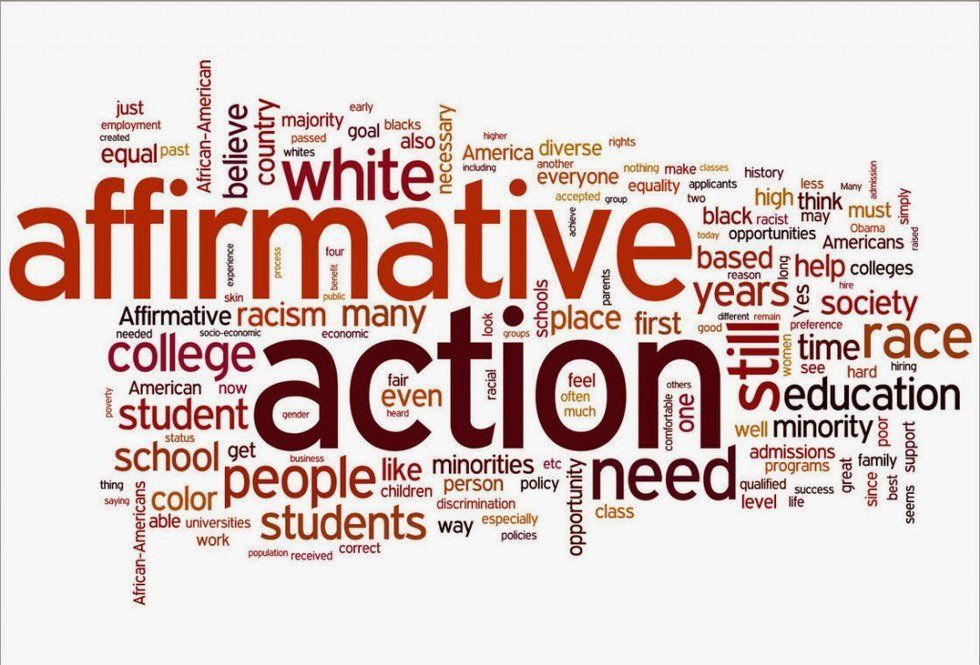The topic of whether Affirmative Action should be used in the collegiate admissions process in the form of taking race into account is a topic which is often inflated with lame statistics and historically inadequate analysis; whereas it needs to be viewed from a perspective which acknowledges substantive statistics alongside historical continuities which still affect several minorities today.
To start, the argument that college admissions should be based simply on merit is a fundamentally disingenuous one since several factors which have nothing to do with merit count into the admissions process even when disregarding race - albeit athletic abilities, legacy, etc. With this being said, how is it considered unfair to regard ones race when it comes to this process? Unless one is unaware of the burdens carried by minorities in contemporary society, so let me enlighten you.
When policies regarding the equaling of social standings amongst race are brought about, it is naively presumed that all races begin their educational careers on the same playing field and go throughout their journey on an unequivocal, fair track. This sentiment is fundamentally incorrect, with 36% of black children being born into poverty and around 27% of black families living in poverty - and being estimated that an income doubled than that where the line of poverty actually is, is needed for a one to live comfortably - they indubitably start the race of life a few meters behind their white counterparts, and with affirmative action on its current path of dissipation, the chances for blacks and other minorities to make it out of their current situation is lessened.
In recent years, presidents have done very little (if anything) to lighten the load being carried by those in poverty, rather they've assisted the trend and have either stagnated or increased the number of people in poverty. Whether it was Nixon’s implementation of the War on Drugs which explicitly targeted blacks and hippy whites to Reagan’s Trickle Down Economics which hurt the working class to Bill Clinton’s implementation of the Crime Bill which put Nixon's original War on Drugs and Reagan's tough-on-crime sentiments on steroids, and more significant to this topic, Clinton's Welfare Reform Bill which doubled extreme poverty, to Obama advocating for Free Trade deals and increasing funding to the prison system (and even publicly shamingHistorically Black Universities and cutting their fundingwhich produce a vast number of Black lawyers, doctors, judges, etc) to Hilary Clinton already taking hundreds of thousands of dollars from private prison systems, all of these things devastate the black and poor community as a whole.
Not to mention how the famous, symbolic case of Brown v. Board has not been as substantive as minorities would have hoped. With the assistance of historic FHA redlining and mass migration which systemically and systematically set ghettos in place and formed subtle segregation, the minority of races and the majority are still separated and unequal. This is evident through the disparity in the quality and funding between inner-city public schools (which are majority minority) and charter, magnet, and academy schools.
The result of such a disparity is an irrefutable devaluing of education between public and private schools which further results in those who attend said public schools – which again are majority minority students – having less extracurricular activities (resulting in less achievements to fill resume with) to participate in, having less resources to help prepare for standardized test, and being in a system which strategically prepares them to not go to college (the school-to-prison pipeline.)
Taking only these few factors into consideration, it is only sensible that we not only consider race in the collegiate admissions process, but that we refocus our government policy on those in less fortunate situations than our own, while also acknowledging that good ol’ merit and hard work will only get you so far in life. If one is not provided with opportunity – regardless of how talented one may be, they will not advance or reach their desired levels of success.
Something else which also needs to be addressed is the way in which race counts into the actual college admissions process, for there seems to be an alarming, fundamental misconception in the mindset of those who oppose this form of affirmative action.
In short, colleges use a holistic review system where they, not only consider strictly merit (grades and standardized/college test scores) or any one particular category, rather they encompass everything altogether – everything including merit, volunteer work, work experience, athletic accomplishments, legacy, extracurricular involvement, etc.
When acknowledging “race” in this process, no one is being admitted into a school where they are not qualified or being admitted over people who are more qualified than they are (overall value is determined through the aforementioned holistic process). Rather race is used as a determining factor when comparing two students with equal or similar achievements but are from two different socioeconomic situations; favoring the one in the worse situation due to them not having as many resources available while still obtaining a competitive level of relative success.
One final thing which needs to be acknowledged is the lame misconception that affirmative action and the implementation of race in the college admissions process only favors minority races; this is particularly misleading as affirmative action actually helps people of all races who are at the bottom of the socioeconomic ladder.
This is a class issue, not race. Race only comes into account when acknowledging that historical policies and happenings have assisted in setting the demographic makeup as it is today - with blacks, Native Americans and Hispanics being the most inclined to poverty. All in all, this is a class issue and having affirmative action and CLASS count into the college admissions process is needed for our society, for again, no one will be able to lift themselves up by their own bootstraps if not given an opportunity – an opportunity is all we’re asking for.





















